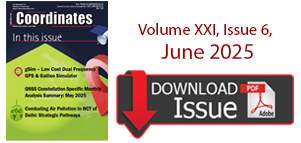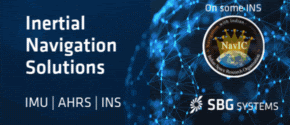
Sherman Lo, Benjamin Peterson, Per Enge
This article assesses the security of eLoran and discusses how its features can be utilized to provide defenses against likely attacks
Global Navigation Satellite Systems (GNSS) have become increasingly interwoven into the fabric of our infrastructure and economic system. However, as the services provided by GNSS become more important for safety …

The need – environment of an Urban Information System has undergone a sea change over the last few years. Couple of years back the requirements of information system was designed and projected primarily from the planners community. They were satisfied if the physical information was supplied on a scale of 1:5000/1:10000…

In a pioneering effort, an Atlas of Madhya Pradesh (MP), India has been prepared for the visually challenged in Hindi Braille. It contains eight theme maps on 1) Districts of MP, 2) National Highways passing through State, 3) Important district roads, 4) Railway Lines passing through state and their Junctions…

The Netherlands are a small country in the North West part of Europe with a high density of population. The area of only 41.000 km² is used by 16 Mio. Inhabitants, resulting into 400 inhabitants per km². There is an excellent infrastructure with 2.300 km of motorways and 137.000 km of roads in total complemented by a network of railways and bicycle tracks. The roads are used by 8 Mio. cars and 140.000 heavy goods vehicles. Although…

GPS IC shipments forecast for 2010
According to ABI research GPS IC shipment growth should see a 30% increase. The unabated interest in GPS-enabled smartphones during the recession has been a life-saver for the GPS IC industry, and future growth will be fuelled by the integration of GPS in feature phones across Europe and Asia. www.abiresearch.com

The damage caused by Hurricane Katrina to the southern United States has exploded the myth that natural disasters happen only to poor countries. Yet there is a grain of truth in the myth. Natural disasters happen all over the world, but the extent of damage and loss of life has far more to do with the preparedness and responsiveness of the relevant human systems, not only where the disaster happens but also often half-way across the world.

China Navigation Map Market Report
According to China Navigation Map Market Report, 2008-2009, the Chinese car navigation market is in its early stage. In 2008, the market penetration rate of car navigation in China was only 4.56%, far lower than the 60% of Japan, and 20%-30% of both Europe and U.S.A. In 2008 a total of 3.1 million navigation devices were sold, more than double than that in 2007. www.pr-inside.com

Roadside assistance with SPOT satellite GPS messenger
SPOT Assist Roadside combines GPS and satellite communications technologies to deliver location-based messaging regardless of cellular network coverage. The “Help” button on the handheld SPOT Messenger can instantly alert a national roadside response centre of their location and need for roadside assistance from virtually anywhere in North America. The program includes fi ve roadside tows per year, up to 50 miles per tow, as well as auto-accident assistance, fuel delivery services, tyre repair etc. www.spot.com

Basic Act on the Advancement of Utilizing Geospatial Information was approved by the cabinet in Japan last year. It states the promotion of the various kinds of the applications of geodetic information in both private and public areas to realize the convenient and safe society. The supplementary budget to save the economical crises this year in Japan prepares a lot of money to promote the utilization of geographic information. In order to realize such society in near future,…

Loran is best. Keep it!
Says a recent study which was completed in March 2007 by the Independent Assessment Team (IAT). The report has been let out of detention, just in time to counter recent efforts by the Obama administration, the Department of Homeland Security, and the US Coast Guard to throttle the program. The IAT “unanimously recommends that the US government complete the eLoran upgrade and commit to eLoran as the national backup to GPS for 20 years.” The IAT’s conclusion has long been informally known throughout the GPS industry, but the report’s release adds considerable weight, expertise, and specifics to a long, determined campaign to preserve the program. Release of this report now comes only after an extensive Freedom of Information Act (FOIA) battle waged by industry representatives against the federal government. The report asserts that “eLoran is the only cost-effective backup for national needs; it is completely interoperable with and independent of GPS, with different propagation and failure mechanisms. … It is a seamless backup, and its use will deter threats to US national and economic security by disrupting (jamming) GPS reception.” www.ida.org
…Senate Committees support eLoran
Two leading Senate committees publicly back the eLoran system and question the US President’s latest budget proposal. The FY 2010 Concurrent Budget Resolution releases views from the US Senate Committee on Commerce, Science and Transportation and the Committee on Homeland Security and Governmental Affairs backing the continued support for the Loran system, acknowledging the investment already made in infrastructure upgrades and recognizing the studies performed and multi-departmental conclusion that eLoran is the best backup to GPS. Senator Jay Rockefeller, the Chairman of the Committee on Commerce, Science and Transportation, wrote the committee recognized the priority in “maintaining LORAN-C while transitioning to eLORAN” as means to enhance the homeland security, marine safety and environmental protection missions of the Coast Guard. Senator Collins, the ranking member on the Committee on Homeland Security and Governmental Affairs wrote that the President’s budget overview proposal to terminate the LORAN-C system is inconsistent with the recent investments, recognized studies and mission of the US Coast Guard. The letter recognizes the $160 million investment already made toward upgrading the LORAN-C system to support the full deployment of eLoran http://budget.senate.gov/republican/ pressarchive/CommitteePrint.pdf
…US proposal to terminate loran-C draws fire from UK
A last-minute change in US loran policy has raised serious concerns among international navigation and security organizations. In late February, the Office of Management and Budget (OMB) removed loran-C funding from the President’s budget, provoking an immediate response from the UK. The key issue was the continuing need for loran-C and eLoran to provide a backup to GPS, in the event of satellite failures or signal disruption. The UK’s position was that until the OMB’s announcement, the US supported the view that loran provides a backup to GPS, with the Department of Homeland Security stating that loran “will mitigate any safety, security or economic effects of a GPS outage or disruption.” In January, a highlevel DOT panel of independent experts, chaired by Professor Brad Parkinson – the former USAF official in charge of satnav development, now dubbed “The father of GPS” – unanimously recommended that “the US government complete the eLoran upgrade and commit to eLoran as the national backup to GPS for 20 years.” Today, government and commercial communications, finance, utilities, ATC and many other vital services in the US and overseas depend on precise GPS timing, and loran-C and eLoran are the only long-range, unjammable backups that can provide comparable accuracy. www.ainonline.com









 (5.00 out of 5)
(5.00 out of 5)